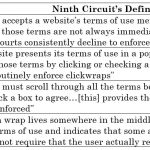
Another TOS Formation Failure in the 9th Circuit–Godun v. JustAnswer
This case involves the JustAnswer service, which ensnares possibly unsuspecting consumers into an auto-renewal that consumers allegedly don’t want. JustAnswers’ TOS formation process was rejected in the California state courts. It fares no better in federal court. Important nomenclature note:…

Ninth Circuit Takes a Wrecking Ball to Internet Personal Jurisdiction Law–Briskin v. Shopify
Let’s start with a tiny piece of good news. The majority says: “The parties agree among themselves that we need not develop an internet-specific standard for personal jurisdiction. We also agree.” No need for Internet exceptionalist rules. Yay! With that…

Rounding Up Some Recent Copyright Decisions
A few recent copyright cases worthy of blog coverage, but not worthy of a standalone post. Omnia Studios Ltd. v. JD E-Commerce America Ltd., 2025 WL 961473 (W.D.N.Y. March 31, 2025) This case involves the service Joybuy, which listed items…

SAD Scheme-Style Case Falls Apart When the Defendant Appears in Court—King Spider v. Pandabuy
The parties’ names make this case sound more like a Hollywood blockbuster movie than a SAD Scheme-like case. This suit isn’t a classic SAD Scheme case because the plaintiffs went after the marketplace, not the merchants. This case involves the…

Courts’ Expectations for TOS Formation Keep Going Up—Lee v. Plex
This is a VPPA claim against Plex (a video streaming service) regarding the use of Meta Pixels. 🙄🙄 The defendant invoked the arbitration clause in its TOS. Extensively citing Chabolla, the court rejects the arbitration request. Here is Plex’s sign-up…

Amazon Isn’t Liable for Marketplace Items That Make False Claims–Planet Green v. Amazon
I previously summarized this lawsuit: The plaintiff sells remanufactured printer ink cartridges. The plaintiff claims that Amazon listings falsely claim that other merchants’ cartridges are “remanufactured” or “recycled.” For reasons unclear to me, the plaintiff thought it would be a…

Purchase First, TOS Presentation Second = TOS Fail–Seneca v. Homeaglow
This case involves the Homeaglow/Dazzle Cleaning services. The plaintiffs claim that purchasing the defendant’s initial loss leader offering caused the plaintiffs to subscribe to a hidden monthly recurring charge. Invoking the arbitration clause in the TOS, the defendant sought to…

Fourth Circuit Upholds TOS Formation Despite a Bad Call-to-Action, But Strikes Down Unilateral Amendment Clauses
Two noteworthy rulings this week from the Fourth Circuit regarding TOS formation issues. Dhruva v. CuriosityStream, Inc., No. 24-1080 (4th Cir. March 10, 2025) Curiosity Stream is a paywalled site for documentary videos. The plaintiffs brought a Meta pixels case…

The Ninth Circuit Has a Lot to Say About Online Contract Formation (Much of It Confusing)–Chabolla v. ClassPass
I previously summarized this case: The plaintiffs claim they signed up for a ClassPass membership but got unexpectedly auto-renewed. (ClassPass appears to be an aggregator of third-party fitness classes). ClassPass sought to send the case to arbitration based on its…

Copyright Owner Prevails in Lawsuit Over Form Contracts–Equine Legal v. Fireline Farms
🚨🚨 Calling all cyberlaw nerds: here is a bona fide “Law of the Horse” case. 🚨🚨 The plaintiff is an Oregon law firm practicing equine law. The defendant runs a Florida horse ranch. In 2016, the defendant licensed the plaintiff’s…
